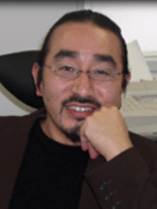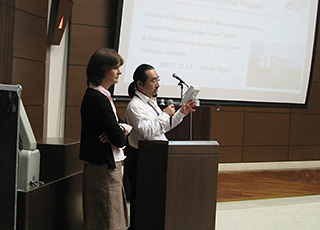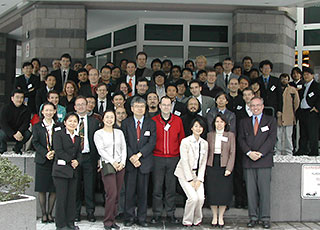お問い合わせ先
Research Cooperation Division I,
International Program Department,
Japan Society for the Promotion of Science (JSPS)
5-3-1 Kojimachi, Chiyoda-ku, Tokyo 102-0083, JAPAN
TEL
+81-3-3263-1944
TEL
fos*jsps.go.jp
Note: Please replace*with @.

 |
Hiroaki Suga Past Participations in FoS:
|
|---|
It was in 2004 that I first participated in a Japanese-German Frontiers of Science (JGFoS) symposium. It was held in Germany. It’s hard to believe that some 10 years have passed since then. I was a bit taken aback by this realization when I started writing this message. More surprisingly, the FoS program has not lost an ounce of stream over these many years. Well, that’s only natural, but nevertheless wonderful, given the painstaking planning that goes into each symposium.
Taking a 10-year trip back in time, I had just gotten back from the US the year before and was struggling to adapt to the Japanese university’s education and research systems when a long-time friend who was a member of the Planning Group for the first JGFoS symposium invited me to be a speaker.
The truth be told, two years previously in 2002, I had already been invited by the National Academy of Science to participate as a discussant in a FoS symposium in the US. Attending it, I was a bit overwhelmed by the high level of the discussion on the session theme. It caused me to think about just how much I lacked understanding of other people’s areas of research. In the same cross-disciplinary style, I heard that Japanese and German researchers would engage in discussions in other FoS symposiums, and recall being skeptical as to whether it would be possible for them to advance their discussions on a high level. When it came to actually participating in a JGFoS symposium, however, I found the discussions to both go well and be high level. This was perhaps because of the excellent selection of the participants and topics, for which I thank profusely the Planning Group members. I was impressed by way in which the Japanese researchers asked probing questions to researchers in other fields and how well they advanced the discussions.
After that first symposium in Mainz, I attended three more JGFoS symposiums as a PGM and a PGM Co-Chair. That gave me the opportunity to talk with many Japanese and German researchers and to develop close friendships with them. I am really thankful to my PGM colleagues, with whom I enjoy continuing collaboration both in and outside the FoS program. For example, a German researcher who was a Planning Group member in the third and fourth symposiums dispatched a female doctorate student to my lab as an intern. Later, I received a letter from her saying that she had received her PhD and that she found her stay in Japan to have been a really exciting experience. This, I believe is precisely the sort of international exchange that the FoS program seeks to spawn.
Now, most FoS participants are 10 or more years younger than me. Like I had, they are I’m sure deriving much stimulation from their experience in these symposiums. Being a PGM requires keeping lots of commitments, but I know that the members will garner an even greater measure of stimulation through their participation in the Planning Group including the rigorous process of selecting session topics. Whether that stimulation will be a driving force in advancing the FoS participants’ own research or in broadening the horizons of their future research endeavors will depend largely upon how each of them perceives and digests their FoS experience. I am confident that researchers who say “I was also a FoS participant” will play leading roles in innovating and advancing science on a global stage.
 【4th JGFoS Giving session introduction】 |
 【1st JGFoS Group photo (middle)】 |